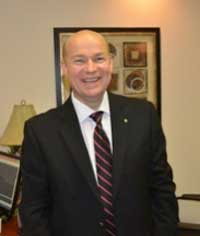

Note: Patients must be referred to this program by a physician or nurse practitioner. For more information, please telephone: (807) 684-6058.
Donald Pelletier Has Transformed with Weight Loss

This is the new Donald Pelletier, one who has completely transformed the way he thinks about food, thanks to a new program at the Regional Bariatric Care Centre at Thunder Bay Regional Health Sciences Centre (TBRHSC).
After he left home to study at the age of 18, he started eating more fast food, which quickly led to a noticeable weight gain.
Though he had varying success with a number of diets over the years, his weight had climbed to 265 lbs by the time he got married.
Apart from sleep apnea, he did not experience many of the common weight-related health issues such as hypertension or diabetes. However, he noticed that he was less flexible and that it took more effort getting out of bed or playing with his kids.
“I was aware that my weight was limiting my actions and that I was shortening my lifespan and that it affected everyone around me,” says Pelletier. “Being overweight was a constant source of stress.”
His nurse practitioner referred him to TBRHSC’s Regional Bariatric Care Centre where he opted to participate in the Medical Management Program comprised of a 12-week cognitive behaviour program or a 26-week program including 12 weeks of meal replacement. Facilitated by an interprofessional team that includes an Endocrinologist, Nurse Practitioner, Registered Nurse, Social Worker, Psychologist, Kinesiologist and Registered Dietitians, the program was launched last February as an alternative to bariatric surgery thanks to $300,000 in funding from the Ministry of Health and Long-Term Care.
When Pelletier started the program last February, he weighed 285 lbs. He immediately went from consuming 3000 to 4000 calories per day to 900 calories in the form of four Optifast shakes per day.
“The first three weeks are the toughest,” he says.
Two of the biggest differences between this program and others Pelletier had tried in the past were the support and education components. “If you don’t understand why you’re eating excessively you can’t solve the problem. They help you realize why you’re overeating and find solutions.”
Even with the support of the program and from other people going through the same experiences and emotions, he says it is important to stay mentally strong in order to fight the inevitable negative thoughts. “I got angry with myself, even though I was doing well. There was a lot of crying, swearing and praying when those moments come. You feel like you’re fighting a system – convenience and fast food restaurants and their commercials are everywhere. It feels very lonely. Whenever I would get frustrated I would think, ‘I don’t want to go back. This is the new me.’”
The new Donald Pelletier is more mindful of what he eats and has learned that the purpose of food is to provide the body with fuel. Broccoli, cauliflower, apples and bananas have become some of his favourite snack foods. He has more energy to do what he enjoys: play tennis, go rollerblading or play with his kids. Even the sleep apnea symptoms have disappeared. As part of the maintenance phase of the programming, Pelletier will follow up in the clinic for another 2 years.
“I’m appreciative of the opportunity to participate in this program,” he says. “It has changed my life.”






